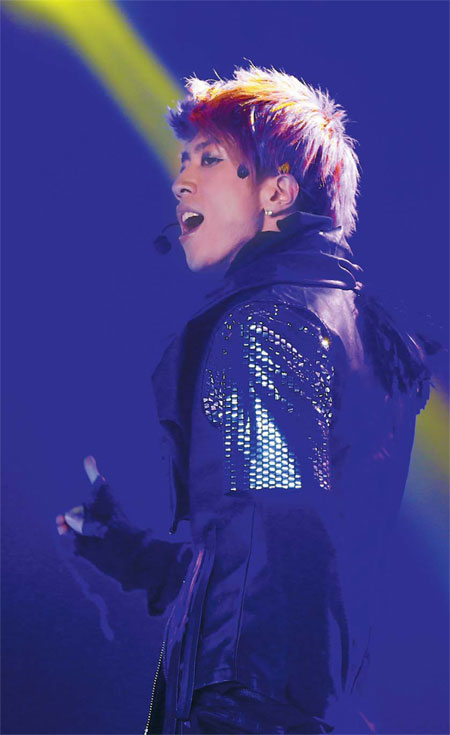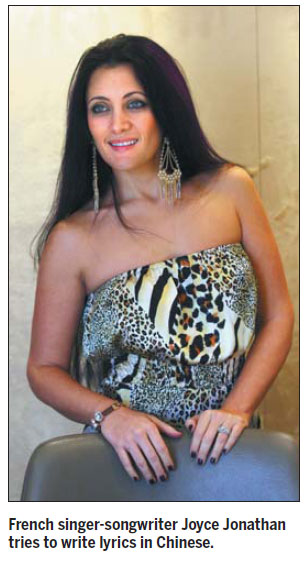Plugging in
Updated: 2012-02-22 10:23
By Chen Nan (China Daily)
|
|||||||||||
 |
|
South Korean singer Lee Jae-won performs in Beijing to announce his comeback in China. [Photos by Zou Hong / China Daily] |

South Korean singer Lee Jae-won is among the growing number of artists from abroad who are hoping to make it big in the expanding China market. Chen Nan reports.
When 31-year-old South Korean singer Lee Jae-won was discharged from the army in 2010, he decided to announce his comeback in China - rather than his home country. On a chilly winter night in Beijing, the youngest member of boy band H.O.T. wears a black futuristic armor-like suit as the spotlight focuses on him. Nearly 500 fans squeezes into a small venue shout his name and Lee thanks them in Mandarin. Another 500 fans wait outside the venue, hoping to get a glimpse of their idol.
With a new electronic album to plug, It's the Time, Lee signed up with a Chinese entertainment company in late 2011.
"China is on the tip of everybody's tongue. Ever since I served in the army, I have considered coming to China to develop my career," Lee says.
He learned Mandarin for eight months before teaming up in 2010 with China Music, a Beijing entertainment company.
He is among the latest in a growing tide of foreign acts hoping to explore the China market. Once largely dominated by Hong Kong and Taiwan singers, the Chinese mainland has emerged as a crucial territory on pop's global map, especially at a time when record sales in the West continue to plunge.
Though Lee performed in China with H.O.T in the mid-1990s, choosing to develop his career here is a big challenge.
First off is learning the language. Lee says he got a tutor to begin with and then studied by himself.
"Simple conversation is not a problem for me, but I still cannot read and write fluently," he says. The lyrics of his new song, It's the Time, were written by a Chinese musician, while a South Korean musician composed the music.
"I have to know the meaning of the lyrics before I sing, which takes a lot of time. My songs are really fast. It's harder to sing in Chinese while dancing," he says. "Before meeting my fans tonight, I practiced until midnight every day to make sure the lyrics could be understood."
Jin Qizhong, the artistic director of China Music, says young Chinese are crying out for pop music stars from South Korea, citing acts like Super Junior and Girls' Generation.
"The new generation in China is less concerned with boundaries. It is drawn by dancing, fashionable music and makeup," says Jin, who introduced Lee to China Music and is planning to add Tony An, another member of H.O.T, to the company.
However, crossing over to the Chinese market is a long-term project. Adapting to Chinese culture is much more difficult than simply learning the language, Jin points out.
"The Chinese record company helps the singer do market research and find the latest music trends," Jin says. "It's time-consuming and costs a lot of money."
The payoff is China's huge market.
Fortunately for Lee, he built a large fan base when he was in H.O.T. and this gives him a head start in China as a solo artist.
Another foreign artist trying to break the China market is French singer-songwriter Joyce Jonathan, who performed at the 2012 Spring Festival Gala of Beijing TV Station.
Jonathan started taking Mandarin classes at college when she was 15 years old. Her parents, who speak Mandarin, often travel to China for work.
"The first sentence I learned was "zhongguo da" ("China is big")," she says, smiling. "Mandarin is a language that is very important, and I find it very musical."
The 21-year-old will tour to promote her second album in China from March 2012, and half the songs will have Chinese lyrics.
"Language is crucial for me to communicate with fans. When I sing in French, the audience just listens quietly. But when I sing popular Chinese songs, they react warmly," Jonathan says. "So now I try to write lyrics in Chinese and let my Chinese friends listen first. Then I revise the lyrics."
Jonathan's music is popular on Douban, the largest Chinese website devoted to movies, books and music reviews. Some are attracted by her exotic appearance while others compare her to singer-songwriters like Cheer Chen and Zhang Xuan.
"Feedback is fast and direct when I perform onstage. If they like your music, they stay. If they don't like it, they just leave," she says.
Italian-born soprano Giorgia Fumanti, with Universal Music, came to China in December 2011 to promote her album, Elysium, which includes three Chinese songs.
"Chinese audiences are very open to international artists," she says.
Fumanti says China is one of the countries she wants to become well known in after the birth of her daughter in 2011.
However, classical music is still a minority taste, so working with Chinese artists is a way for her to get better known. As such, she worked with pianist Lang Lang in 2011.
"Chinese audiences are attracted to foreign faces not just because they can speak or sing in Chinese. Audiences want to find a connection and diversified music sources," Caralinda Booth, A&R Consultant at Universal Music China, says.
"Now, a big name from the West coming to China is not big news, let alone young singers who are less famous. They have to adapt, or they die."
Today's Top News
President Xi confident in recovery from quake
H7N9 update: 104 cases, 21 deaths
Telecom workers restore links
Coal mine blast kills 18 in Jilin
Intl scholarship puts China on the map
More bird flu patients discharged
Gold loses sheen, but still a safe bet
US 'turns blind eye to human rights'
Hot Topics
Lunar probe , China growth forecasts, Emission rules get tougher, China seen through 'colored lens', International board,
Editor's Picks

|

|

|

|

|

|





